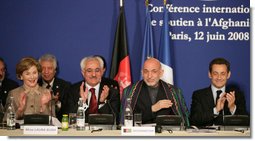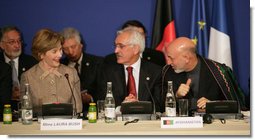
 |
For Immediate Release
Office of the First Lady
June 12, 2008
Mrs. Bush's Remarks at International Conference in Support of Afghanistan
Centre de Conferences Internationals
Paris, France
10:40 A.M. (Local)
MRS. BUSH: Thank you very much. Thank you for including me in this wonderful support conference. And I want to thank especially President Sarkozy and the government of France for hosting us today, and, of course, our co-chairs, the government of Afghanistan, the United Nations.
President Karzai, thank you. I had a really wonderful visit to your country this weekend. Ban Ki-moon, the Secretary General, thank you for all your good work. And the Special Representative, Kai Eide, thank you very much as well. Foreign Minister Kouchner, thank you very much for being our host today.
 Earlier this year at the White House, I met with some Afghan women
whose report has weighed on my mind ever since. These government
officials and professional women told me that they live in daily fear
that the Taliban's violence will reverse Afghanistan's progress toward
freedom. Their message was that we must take advantage of this time, or
as one woman put it: "This is our only chance."
Earlier this year at the White House, I met with some Afghan women
whose report has weighed on my mind ever since. These government
officials and professional women told me that they live in daily fear
that the Taliban's violence will reverse Afghanistan's progress toward
freedom. Their message was that we must take advantage of this time, or
as one woman put it: "This is our only chance."
When the Taliban was driven from power in 2001, they left the Afghan people to build a society from nothing. Amid the wreckage of three decades of war, the people of Afghanistan remain determined. After only seven years, girls are participating in classrooms, new roads are being built, and women are assuming government leadership, including my host in Bamiyan, Afghanistan's first female governor, Habiba Sarabi.
In Bamiyan province, I saw how these new developments are offering Afghans hope. Yet many hurdles lie ahead, and my trip was a reminder of these, too. The new schools and roads I visited stood in the shadow of Bamiyan's sandstone cliffs where the hollow caves are all that remain of Afghanistan's ancient Buddhas, blown up by the Taliban in 2001.
Those scars in the cliffside are a remainder of the danger lurking in the Afghan hills. Female elected officials remain targets for attack. Women training to be police officers are afraid to tell their families. And teachers and students at new schools are faced with the violence that has devastated their country.
This conference is our chance to help the people of Afghanistan build the civic and economic institutions that can withstand these forces of oppression. We all know that success will not be easy, but Afghanistan has reached a decisive moment for its future. We must not turn our backs on this opportunity.
Today the United States is dedicating $10.2 billion to help the people of Afghanistan implement their National Development Strategy over the next five years. If Congress approves all of this funding, it will add to the more than $26 billion in U.S. humanitarian assistance to Afghanistan since 2001.
 Educating Afghanistan's men, women, and children is critical to
this nation's long-term success. The number of Afghan students in
school has increased from 900,000 under the Taliban to nearly 6 million
students -- including one and a half million girls.
Educating Afghanistan's men, women, and children is critical to
this nation's long-term success. The number of Afghan students in
school has increased from 900,000 under the Taliban to nearly 6 million
students -- including one and a half million girls.
In Kabul, I met with students from Kabul University, the American University of Afghanistan, the International School of Kabul, and the Women's Teacher Training Institute. I spoke with young women planning careers in science and international relations. A student from American University told me how his school offers new courses in liberal arts. But even as they described progress, these students shared a long list of needs -- from updated materials to qualified teachers.
Representatives from the Women's Teacher Training Institute told me that many potential students do not have the education necessary to prepare them for university classes. Their organization has been responding to this need through the Learning and Community Empowerment program. On Sunday, I announced that USAID will support this and other educational initiatives with a $40 million grant to the Afghan Ministry of Education's National Literacy Center.
Government commitments can be supplemented by donations from the private citizens, corporations, and foundations. The U.S.-Afghan Women's Council, established by President Bush and Karzai in 2002, is encouraging individual American citizens to contribute to the Afghan people's success. Today the Council supports more than 30 programs worth $70 million in private sector funding.
I saw one of these programs in Bamiyan, at the construction site of the Ayenda Foundation's new learning center. This school, funded by Afghan and American citizens, will provide a safe place to live or study for more than 200 children who were orphaned by the Taliban.
The ARZU program is another Council effort that's helping women and children who were denied even basic education under the Taliban. Through this initiative, women are given access to education and health care as they earn money by selling hand-crafted carpets.
Mohamad is the father of two girls who participate in this program. They go to school in the mornings and weave in the afternoons. "I'm very proud that my daughters are learning to read," he says. "I don't want them to be illiterate like I am."
Citizens from every country can support Afghanistan's progress by sharing the benefit of our experience. General Jeff Schloesser, the Commanding General of Combined Joint Task Force 101 and Regional Commander East, told me this weekend about National Guard members from Texas, farmers who are supporting agricultural development in eastern Afghanistan's Ghazni province. And Afghan potato farmers in Bamiyan have learned storage methods from an Idaho potato farmer that are making their crops more profitable.
NATO's 26 provincial reconstruction teams are helping implement similar infrastructure and security projects throughout Afghanistan. In Bamiyan, I was welcomed by Kiwi troops from New Zealand's provincial reconstruction team. They greeted me with a traditional "Powhiri" ceremony, led by three soldiers in traditional warrior dress. Even though New Zealand's national defense force is not large, its PRT has been providing security and promoting development in Bamiyan since 2003. Their work shows the power of international collaboration in securing Afghanistan's progress.
The Afghan people have shown me their determination to see their country succeed. And now it's up to the international community to do our part to help make that success possible.
I'm encouraged that this delegation of 80 countries and organizations has gathered here in Paris today. As the Afghan woman told me, this is our only chance. Today, it's our chance to reaffirm our commitment to Afghanistan's success.
Thanks to each and every one of you for your support. (Applause.)
END 10:48 A.M. (Local)